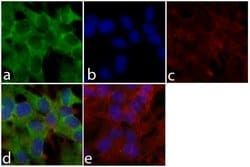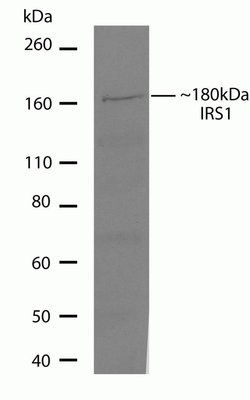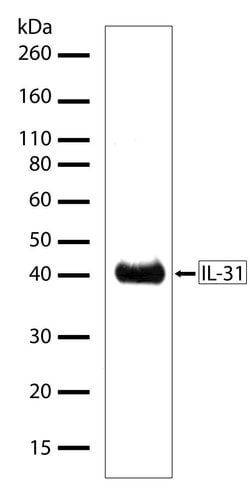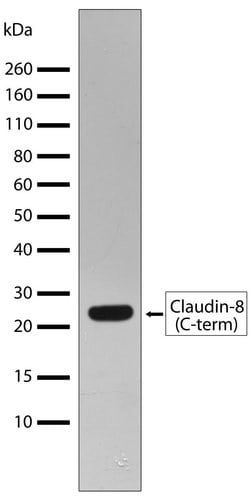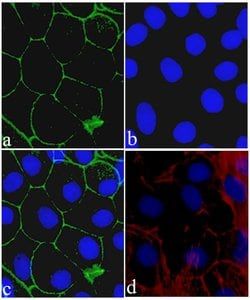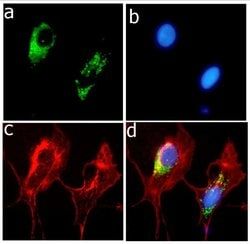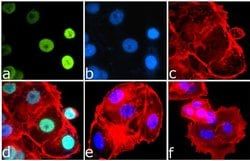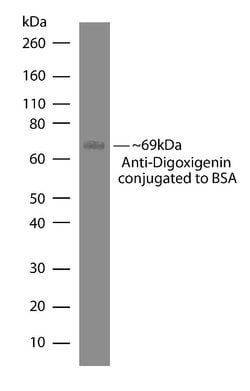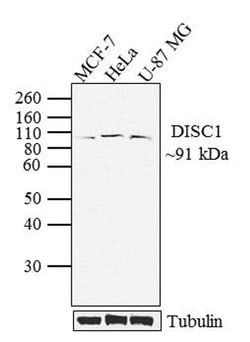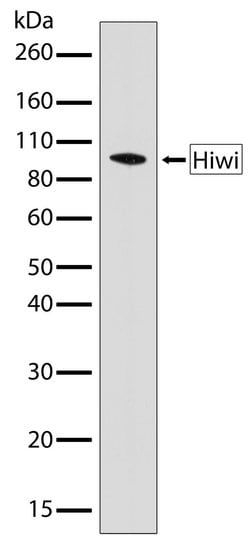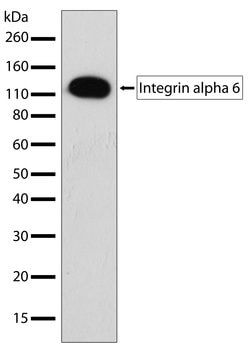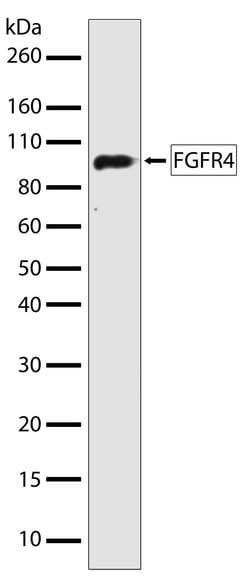PI701172
DISC1 Recombinant Rabbit Monoclonal Antibody (4H21L1), Invitrogen™
Manufacturer: Thermo Scientific
Select a Size
| Pack Size | SKU | Availability | Price |
|---|---|---|---|
| Each of 1 | PI701172-Each-of-1 | In Stock | ₹ 44,544.50 |
PI701172 - Each of 1
In Stock
Quantity
1
Base Price: ₹ 44,544.50
GST (18%): ₹ 8,018.01
Total Price: ₹ 52,562.51
Antigen
DISC1
Classification
Recombinant Monoclonal
Concentration
0.5 mg/mL
Formulation
PBS with 0.09% sodium azide
Gene Accession No.
Q810H6, Q811T9, Q9NRI5
Gene Symbols
DISC1
Immunogen
Peptide corresponding to amino acids 419–428 of human DISC1
Quantity
100 μg
Primary or Secondary
Primary
Target Species
Human, Mouse, Rat
Product Type
Antibody
Isotype
IgG
Applications
Western Blot
Clone
4H21L1
Conjugate
Unconjugated
Gene
DISC1
Gene Alias
C1orf136; DISC1; disrupted in schizophrenia 1; disrupted in schizophrenia 1 homolog; Disrupted in schizophrenia 1 protein; KIAA0457; RP4-730B13.1; SCZD9
Host Species
Rabbit
Purification Method
Protein A
Regulatory Status
RUO
Gene ID (Entrez)
244667, 27185, 307940
Content And Storage
Store at 4°C short term. For long term storage, store at -20°C, avoiding freeze/thaw cycles.
Form
Liquid
Related Products
Description
- This antibody is predicted to react with mouse and rat based on sequence homology
- Intact IgG appears on a non-reducing gel as ∽150 kDa band and upon reduction generating a ∽25 kDa light chain band and a ∽50 kDa heavy chain
- Recombinant rabbit monoclonal antibodies are produced using in vitro expression systems
- The expression systems are developed by cloning in the specific antibody DNA sequences from immunoreactive rabbits
- Then, individual clones are screened to select the best candidates for production
- The advantages of using recombinant rabbit monoclonal antibodies include: better specificity and sensitivity, lot-to-lot consistency, animal origin-free formulations, and broader immunoreactivity to diverse targets due to larger rabbit immune repertoire
- DISC1 (Disrupted in Schizophrenia 1) is a multifunctional protein that interacts with multiple proteins of the centrosome and cytoskeletal system, and is involved in neuronal functions that are dependent upon proper cytoskeletal regulation, including neuronal migration, neurite architecture and intracellular transport
- Regions of the brain which express DISC1 include the hippocampus, lateral septum, amygdala, cerebral cortex, cerebellum and paraventricular hypothalamus, and loss of DISC1 function results in differences in structural organization.The DISC1 gene locus is associated with patients afflicted with schizophrenia as a result of chromosomal translocations
- DISC-1 encodes a large protein predicted to contain a globular N-terminal domain and a helical C-terminal domain, both of which have the potential to form interactions with other proteins
- DISC-1 interacts with proteins involved in the centrosome and cytoskeletal system, including MIPT3, MAP1A and NUDEL; proteins which localize receptors to membranes, including alpha-actinin 2, beta 4-spectrin; and proteins which transduce signals from membrane receptors, including ATF-4 and ATF-5
- Therefore, DISC-1 is thought to be involved in intracellular transport, neurite architecture and/or neuronal migration, all of which are thought to be pathogenic in the schizophrenic brain
- Decreased expression of DISC1 in neurons caused an accelerated rate of neuronal integration, resulting in aberrant morphological development, suggesting that DISC1 plays a role in dendritic development and synapse formation
- DISC-1 is thought to be involved in intracellular transport, neurite architecture and/or neuronal migration, all of which are thought to be pathogenic in the schizophrenic brain.
Compare Similar Items
Show Difference
Antigen: DISC1
Classification: Recombinant Monoclonal
Concentration: 0.5 mg/mL
Formulation: PBS with 0.09% sodium azide
Gene Accession No.: Q810H6, Q811T9, Q9NRI5
Gene Symbols: DISC1
Immunogen: Peptide corresponding to amino acids 419–428 of human DISC1
Quantity: 100 μg
Primary or Secondary: Primary
Target Species: Human, Mouse, Rat
Product Type: Antibody
Isotype: IgG
Applications: Western Blot
Clone: 4H21L1
Conjugate: Unconjugated
Gene: DISC1
Gene Alias: C1orf136; DISC1; disrupted in schizophrenia 1; disrupted in schizophrenia 1 homolog; Disrupted in schizophrenia 1 protein; KIAA0457; RP4-730B13.1; SCZD9
Host Species: Rabbit
Purification Method: Protein A
Regulatory Status: RUO
Gene ID (Entrez): 244667, 27185, 307940
Content And Storage: Store at 4°C short term. For long term storage, store at -20°C, avoiding freeze/thaw cycles.
Form: Liquid
Antigen:
DISC1
Classification:
Recombinant Monoclonal
Concentration:
0.5 mg/mL
Formulation:
PBS with 0.09% sodium azide
Gene Accession No.:
Q810H6, Q811T9, Q9NRI5
Gene Symbols:
DISC1
Immunogen:
Peptide corresponding to amino acids 419–428 of human DISC1
Quantity:
100 μg
Primary or Secondary:
Primary
Target Species:
Human, Mouse, Rat
Product Type:
Antibody
Isotype:
IgG
Applications:
Western Blot
Clone:
4H21L1
Conjugate:
Unconjugated
Gene:
DISC1
Gene Alias:
C1orf136; DISC1; disrupted in schizophrenia 1; disrupted in schizophrenia 1 homolog; Disrupted in schizophrenia 1 protein; KIAA0457; RP4-730B13.1; SCZD9
Host Species:
Rabbit
Purification Method:
Protein A
Regulatory Status:
RUO
Gene ID (Entrez):
244667, 27185, 307940
Content And Storage:
Store at 4°C short term. For long term storage, store at -20°C, avoiding freeze/thaw cycles.
Form:
Liquid
Antigen: PIWIL1
Classification: Recombinant Monoclonal
Concentration: 0.5 mg/mL
Formulation: PBS with 0.09% sodium azide
Gene Accession No.: Q96J94, Q9JMB7
Gene Symbols: PIWIL1
Immunogen: Recombinant protein corresponding to amino acids 90–213 of human Hiwi
Quantity: 100 μg
Primary or Secondary: Primary
Target Species: Human, Mouse, Rat
Product Type: Antibody
Isotype: IgG
Applications: Immunocytochemistry, Western Blot
Clone: 10H15L2
Conjugate: Unconjugated
Gene: PIWIL1
Gene Alias: CT80; CT80.1; HILI; HIWI; mili; Miwi; Miwi like; Miwi likw; PIWI; piwi homolog; piwi like homolog 1; piwi like RNA-mediated gene silencing 1; PIWIL1; PIWIL1L; piwil2-like protein; piwi-like 1; piwi-like homolog 1; piwi-like protein 1; piwi-like protein 2; piwi-like RNA-mediated gene silencing 1
Host Species: Rabbit
Purification Method: Protein A
Regulatory Status: RUO
Gene ID (Entrez): 363912, 57749, 9271
Content And Storage: Store at 4°C short term. For long term storage, store at -20°C, avoiding freeze/thaw cycles.
Form: Liquid
Antigen:
PIWIL1
Classification:
Recombinant Monoclonal
Concentration:
0.5 mg/mL
Formulation:
PBS with 0.09% sodium azide
Gene Accession No.:
Q96J94, Q9JMB7
Gene Symbols:
PIWIL1
Immunogen:
Recombinant protein corresponding to amino acids 90–213 of human Hiwi
Quantity:
100 μg
Primary or Secondary:
Primary
Target Species:
Human, Mouse, Rat
Product Type:
Antibody
Isotype:
IgG
Applications:
Immunocytochemistry, Western Blot
Clone:
10H15L2
Conjugate:
Unconjugated
Gene:
PIWIL1
Gene Alias:
CT80; CT80.1; HILI; HIWI; mili; Miwi; Miwi like; Miwi likw; PIWI; piwi homolog; piwi like homolog 1; piwi like RNA-mediated gene silencing 1; PIWIL1; PIWIL1L; piwil2-like protein; piwi-like 1; piwi-like homolog 1; piwi-like protein 1; piwi-like protein 2; piwi-like RNA-mediated gene silencing 1
Host Species:
Rabbit
Purification Method:
Protein A
Regulatory Status:
RUO
Gene ID (Entrez):
363912, 57749, 9271
Content And Storage:
Store at 4°C short term. For long term storage, store at -20°C, avoiding freeze/thaw cycles.
Form:
Liquid
Antigen: CD49f
Classification: Recombinant Monoclonal
Concentration: 0.5 mg/mL
Formulation: PBS with 0.09% sodium azide
Gene Accession No.: P23229, Q61739
Gene Symbols: Itga6
Immunogen: Recombinant protein corresponding to amino acids 102-299 of human Integrin alpha 6
Quantity: 100 μg
Primary or Secondary: Primary
Target Species: Canine, Human, Mouse
Product Type: Antibody
Isotype: IgG
Applications: Western Blot
Clone: 5H14L18
Conjugate: Unconjugated
Gene: Itga6
Gene Alias: 5033401O05Rik; AI115430; Alpha6p; CD49 antigen-like family member F; CD49f; DKFZp686J01244; FLJ18737; integrin alpha 6; integrin alpha-6; Integrin alpha-6 heavy chain; Integrin alpha-6 light chain; integrin alpha6B; integrin subunit alpha 6; integrin, alpha 6; Itga6; ITGA6B; LOW QUALITY PROTEIN: integrin alpha-6; Processed integrin alpha-6; VLA-6
Host Species: Rabbit
Purification Method: Protein A
Regulatory Status: RUO
Gene ID (Entrez): 100856563, 16403, 3655
Content And Storage: Store at 4°C short term. For long term storage, store at -20°C, avoiding freeze/thaw cycles.
Form: Liquid
Antigen:
CD49f
Classification:
Recombinant Monoclonal
Concentration:
0.5 mg/mL
Formulation:
PBS with 0.09% sodium azide
Gene Accession No.:
P23229, Q61739
Gene Symbols:
Itga6
Immunogen:
Recombinant protein corresponding to amino acids 102-299 of human Integrin alpha 6
Quantity:
100 μg
Primary or Secondary:
Primary
Target Species:
Canine, Human, Mouse
Product Type:
Antibody
Isotype:
IgG
Applications:
Western Blot
Clone:
5H14L18
Conjugate:
Unconjugated
Gene:
Itga6
Gene Alias:
5033401O05Rik; AI115430; Alpha6p; CD49 antigen-like family member F; CD49f; DKFZp686J01244; FLJ18737; integrin alpha 6; integrin alpha-6; Integrin alpha-6 heavy chain; Integrin alpha-6 light chain; integrin alpha6B; integrin subunit alpha 6; integrin, alpha 6; Itga6; ITGA6B; LOW QUALITY PROTEIN: integrin alpha-6; Processed integrin alpha-6; VLA-6
Host Species:
Rabbit
Purification Method:
Protein A
Regulatory Status:
RUO
Gene ID (Entrez):
100856563, 16403, 3655
Content And Storage:
Store at 4°C short term. For long term storage, store at -20°C, avoiding freeze/thaw cycles.
Form:
Liquid
Antigen: FGFR4
Classification: Recombinant Monoclonal
Concentration: 0.5 mg/mL
Formulation: PBS with 0.09% sodium azide
Gene Accession No.: P22455
Gene Symbols: Fgfr4
Immunogen: Recombinant protein corresponding to amino acids 22–141 of human FGFR4
Quantity: 100 μg
Primary or Secondary: Primary
Target Species: Human
Product Type: Antibody
Isotype: IgG
Applications: Immunocytochemistry, Western Blot
Clone: 14H10L9
Conjugate: Unconjugated
Gene: Fgfr4
Gene Alias: CD334; CTLA-2-beta protein; FGF Receptor 4; Fgfr4; FGFR-4; Fibroblast growth factor receptor 4; fibroblast growth factor receptor 4 16 minus form; hydroxyaryl-protein kinase; JTK2; MGC20292; Mpk-11; protein-tyrosine kinase; protein-tyrosine kinase receptor MPK-11; TKF; tyrosine kinase related to fibroblast growth factor receptor; tyrosylprotein kinase
Host Species: Rabbit
Purification Method: Protein A
Regulatory Status: RUO
Gene ID (Entrez): 2264
Content And Storage: Store at 4°C short term. For long term storage, store at -20°C, avoiding freeze/thaw cycles.
Form: Liquid
Antigen:
FGFR4
Classification:
Recombinant Monoclonal
Concentration:
0.5 mg/mL
Formulation:
PBS with 0.09% sodium azide
Gene Accession No.:
P22455
Gene Symbols:
Fgfr4
Immunogen:
Recombinant protein corresponding to amino acids 22–141 of human FGFR4
Quantity:
100 μg
Primary or Secondary:
Primary
Target Species:
Human
Product Type:
Antibody
Isotype:
IgG
Applications:
Immunocytochemistry, Western Blot
Clone:
14H10L9
Conjugate:
Unconjugated
Gene:
Fgfr4
Gene Alias:
CD334; CTLA-2-beta protein; FGF Receptor 4; Fgfr4; FGFR-4; Fibroblast growth factor receptor 4; fibroblast growth factor receptor 4 16 minus form; hydroxyaryl-protein kinase; JTK2; MGC20292; Mpk-11; protein-tyrosine kinase; protein-tyrosine kinase receptor MPK-11; TKF; tyrosine kinase related to fibroblast growth factor receptor; tyrosylprotein kinase
Host Species:
Rabbit
Purification Method:
Protein A
Regulatory Status:
RUO
Gene ID (Entrez):
2264
Content And Storage:
Store at 4°C short term. For long term storage, store at -20°C, avoiding freeze/thaw cycles.
Form:
Liquid
